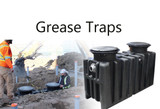How the Food Waste Digester can reduce food waste
According to the National Resources Defense Council:
- Approximately 40% of all edible food is thrown away in the U.S.
- Supermarkets lose $15 billion annually in unsold fruits and vegetables alone
- Restaurants throw out around 10% of the food they purchase
Most people seem to have an inherent understanding of the senselessness and tragedy of wasted food while there is so much need in the world. But what if you knew that every time you threw food away you were contributing to another global problem?
According to the EPA:
- 14% of the greenhouse gases emitted in the U.S. stem from getting food from the farm to your fork and then to the landfill.
- Food waste has increased by 50 percent since the 1970s and is now the largest solid waste contributor to landfills.
- 31 million tons of Americans’ unfinished meals sit in landfills across the country producing methane.
- It is estimated that if we were to prevent this food waste from either being created or disposed of it would be like taking a quarter of all cars in American off the road.
While the latter might seem a daunting and overwhelming task, preventing food waste is something that companies should be focused on; not just finding an easier or cheaper way of disposal. A real plan addresses strategies on how to prevent the creation of food waste all together.
Companies such as The Cheesecake Factory and Fairway Market have incorporated waste reduction or “zero waste” goals into their long-term targets and with the data available from their Food Waste Digester, have also committed to monitor and analyze what is wasted in order to learn more about their potential for greater volumes of prevention and savings.
Reducing and preventing food volume is the highest priority in managing food waste. Detailed and organized data from the Food Waste Digester helps to make informed changes that can positively affect food management practices, staffing, operational activities, and cost of goods sold.
Reusing and donating food benefits others rather than sending it to the landfill. The Food Waste Digester identifies opportunities for future donations.
Recovering uneaten or expired food for a different use is also a better choice than sending it to a landfill, a method soon to be outlawed in some states. The Food Waste Digester can and will eliminate the food waste in a more efficient manner as it converts up to 2,500 pounds of food waste each day into a nutrient-neutral grey water that can be recovered.
Every company’s waste stream is unique, financial and environmental impacts as well as emerging regulatory measures must be considered when designing prevention and diversion goals, but in the end it is good for business, your customers, and the environment to not only divert the waste away from landfills but also to learn how to prevent it all together.
Recent Posts
-
What does Grease Trap do?
Grease traps, also known as grease interceptors, are plumbing devices designed to capture and separa …4th Jun 2024 -
Where to dump a Floor Scrubber?
An important aspect of operating a floor scrubber is the proper dumping of the cleaning solutio …2nd May 2024 -
Why Roof Drains Matter for Commercial Roofs
Why Drainage Matters for Commercial Flat Roofs In the case of flat or slightly pitched roofs, t …20th Sep 2023




